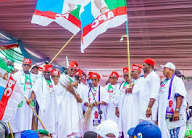Prominent Islamic Cleric Prescribes Death for anyone who Embraces Another Faith

A prominent Nigerian Islamic cleric and the National Chairman of the Council of Ulama of JIBWIS, Sheikh Dr. Ibrahim Jalo Jalingo has stoked a controversy by advocating for the execution of individuals who leave Islam to join other faiths.
On his verified Facebook page, Jalingo cited specific Quranic verses and a Hadith to support his position, referencing a saying attributed to the Prophet Muhammad that “Whoever changes his religion, then kill him.” This directive, according to Jalingo, aligns with Islamic teachings and does not contradict the Quran.
Jalingo’s remarks were a direct response to a social media critic, Masussuka, who challenged the authenticity of the Hadith and argued that it conflicted with Quranic principles such as “There is no compulsion in religion” (Quran 2:256).
However, Jalingo dismissed this critique, asserting that the verse about no compulsion was abrogated by later revelations, including Quran 9:5, which he interprets as a command to kill polytheists, and Quran 4:89, which he claims justifies punishing apostates who turn away from Islam.
The cleric’s stance reflects a traditional interpretation held by some Islamic jurists, rooted in classical Sharia law, where apostasy (riddah) is classified as a Hadd offense, potentially warranting death if the apostate does not repent.
This perspective is based on the belief that the Quran and Hadith are both divine revelations, with the Hadith expanding on concise Quranic directives.
As a result, Jalingo argues that the death penalty for apostasy is a clear Islamic mandate.
However, this stance has been met with significant criticism from modern and reformist scholars, who emphasize Quranic verses promoting religious freedom, such as 2:256 and 18:29.
These scholars argue that no explicit earthly punishment for apostasy is prescribed in the Quran itself and that historical applications of the death penalty often tied apostasy to treason or sedition against the early Muslim community, rather than mere personal disbelief.
The controversy surrounding Jalingo’s statements has significant implications for Nigeria, where Sharia law operates alongside secular law in northern states. As a influential figure within JIBWIS, Jalingo’s rhetoric has the potential to amplify tensions and reignite debates over religious tolerance in a country already fractured by ethno-religious divisions.
The timing of his statement, ahead of the 2027 elections, has also raised concerns about the potential for increased insecurity and political instability.
While Nigeria’s constitution guarantees freedom of religion, Sharia courts in the north have occasionally imposed harsh penalties, although death sentences for apostasy remain rare and unexecuted in modern times.
The public reaction to Jalingo’s statement has been polarized, with some condemning him as a promoter of hate and others defending his theological stance as a legitimate interpretation of Islamic texts.
The controversy highlights Nigeria’s ongoing struggle to balance religious diversity with legal pluralism. The country’s complex religious landscape, with a significant Muslim population in the north and a Christian majority in the south, has often led to tensions and conflicts.
The debate over Jalingo’s statement has also raised questions about the role of religious leaders in shaping public discourse and the need for greater dialogue and understanding between different religious communities.
In response to the controversy, some have called for greater nuance and context in interpreting Islamic texts, recognizing that historical and cultural factors have shaped the application of Sharia law over time. Others have emphasized the need for religious leaders to promote tolerance and understanding, rather than resorting to divisive rhetoric.
Ultimately, the controversy surrounding Jalingo’s statement highlights the complex and often contentious nature of religious discourse in Nigeria. As the country navigates its ongoing struggles with insecurity, political instability, and social fragmentation, it is essential to promote greater understanding, tolerance, and respect for religious diversity. By engaging in open and respectful dialogue, Nigerians can work towards a more inclusive and peaceful society, where individuals of all faiths can coexist and thrive.
The international community has also been watching the situation closely, with some expressing concern about the potential implications of Jalingo’s statement for human rights and religious freedom in Nigeria. The United Nations has emphasized the importance of protecting the rights of all individuals, regardless of their religious beliefs, and has called on governments to ensure that religious freedom is respected and protected.







